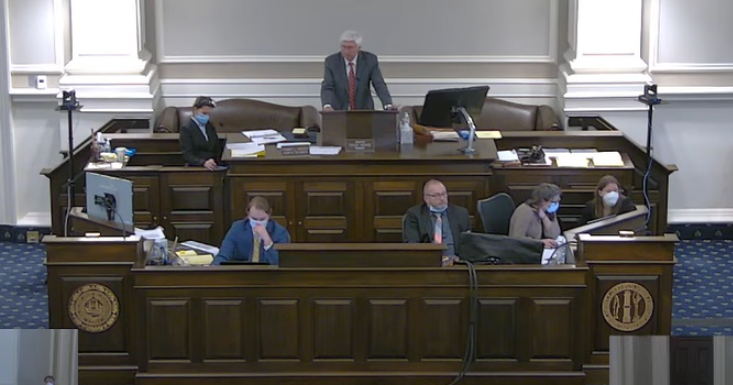By PAULA TRACY, InDepthNH.org
CONCORD – Senators offered to allow health-care insurers to incentivize getting the COVID-19 shots, similar to premium breaks for getting the flu shot, but state Sen. Bob Giuda, R-Warren, claimed that the science to support vaccinations is just not there, calling the bill “irresponsible.”
Senate Bill 319 now goes to the Senate Finance Committee before it can be referred to the House of Representatives.
The Senate held a long session Thursday and passed legislation that touched on issues of labor, women’s reproductive rights, housing, and tenant issues among others, all requiring approval from the House of Representatives and Gov. Chris Sununu before becoming law.
Senate Republicans Repeal Ultrasound Mandate But Refuse Other Changes To New Abortion Ban
The COVID-19 bill, according to its explanation, requires that all health coverage offered by health carriers to employers shall provide a wellness financial incentive to insured persons when voluntarily supplied with sufficient evidence the insured is currently fully vaccinated at the time of enrollment.
Sen. Cindy Rosenwald, D-Nashua, said it is a common-sense market-driven incentive that insurers may offer to get more people vaccinated.
She said choosing the benefit would be similar to other health-related incentives.
Those not eligible for the shot could still get the discount.
She said the cost to not vaccinate is at least $20,000 in COVID-19-related hospitalizations in New Hampshire.
Rosenwald noted the New York Times reported an average of at least $50,000 in costs per hospitalization and Dartmouth-Hitchcock Medical Center in Lebanon notes the costs in an ICU bed for more than four days are nearly $130,000 and most of their ventilator patients are there at least four days.
Those who have been fully vaccinated and had a booster are 95 percent likely to avoid that scenario in a hospital, she said.
But Giuda claimed that the science to support vaccinations is just not there, that he has known fully vaccinated people to die along with those vaccinated and the bill was “irresponsible.”
However, he was in the minority.
Project Labor Agreements
A bill that removes Project Labor Agreements as a condition for state governmental construction contracts passed.
Senate Bill 274 as amended, was passed mostly along party lines 13-11 with Republican Sharon Carson of Londonderry voting with the Democrats to first table then kill the bill. She and the Democrats were unsuccessful.
Sen. Jeb Bradley, R-Wolfeboro offered an amendment to clarify the definition to be the state agency or entity but not cover cities and towns.
Those entities could enter into such labor partnerships still.
Contracts can be allowable voluntarily but cannot be required upfront as a condition of the contract, Bradley said.
Sen. David Watters, D-Dover, said he thinks this is a bad bill in general and particularly so for the college systems and said the bill was not ready to be enacted into law.
Sen. Lou D’Allesandro, D-Manchester, said there is no reason for the government to enter the free market process and PLAs allow for fair and open competition and encourage it among “a highly-skilled workforce” developed privately with educational funds provided by their membership.
New Hampshire has never used a PLA on a state construction process.
Carson reminded the body of a similar bill last year and killed it. The only difference is that last year’s included municipalities and counties.
That bill had too broad a reach, she said.
There is a lot of money coming from the federal government and concern is that these agreements will be a federal requirement, Carson said.
“What really is the problem here?” she said, non-union shops, she added can and have been able to bid on these projects.
She said the legislation is too vague, offers conflicting testimony, and needs more work.
Bradley said construction officials have told him that mandated project labor agreements could cost 20 percent more and that would be coming out of the taxpayers’ pockets and discourage other non-labor companies from bidding.
He said 90 percent of such workers in this state are not unionized.
More SNAP Benefits
SB 404 establishing a supplemental nutrition assistance program, which would be helping an estimated 17,000 New Hampshire children, adults, and elderly who are not currently enrolled in such SNAP food security programs was passed.
The Senate was told 60 percent of eligible seniors are not enrolled.
“Had they, many more millions of federal dollars would have flowed into the state,” said Sen. Rebecca Whitley, D-Hopkinton, said. Federal dollars will be prioritized in funding the administration, said Bradley.
Postpartum Health
SB 407 was passed, expanding Medicaid to support more than two months of postpartum health for young mothers.
Bradley said the bill directs the state Health and Human Services Department to submit a state plan amendment to the Medicaid contract to include a full year of postpartum health rather than 60 days.
It requires quarterly reporting.
Bradley said for many, two months is not enough time for those who are still in a “tenuous position” for the first full year, mothers and children alike.
He said adverse issues the mothers face range from cardiac troubles, substance abuse, depression, and mental health struggles.
Many stood in support of the bill including Sen. Rebecca Perkins Kwoka, D-Portsmouth.
A new mom herself, she said “new moms and new babies are in a precious place,” and need help regardless of their financial means.
The Senate also approved SB 393 related to limiting restraints of incarcerated women who are pregnant. Sen. Rebecca Whitley, D-Hopkinton, said the non-shackling bill “strives to balance all interests involved,” she said.
It is supported by the Commissioner of Corrections and the Senate Judiciary.
Child Support
Senate Bill 431-FN-A passed by a voice vote. It would look at child support which is fair to the child and look to ensure a lifestyle similar in both households where they are placed. Any bill that has an equal or approximately equal parenting schedule must be considered for an adjustment and create clarity, reducing litigation. It goes to the Finance Committee.
Landlords and Housing
SB 329-FN-A which will study housing barriers in New Hampshire, was passed by the Senate.
Sen. Thomas Sherman, D-Rye, said there has not been a study on middle income and workforce housing in a while and the average home price is now $400,000 and even higher in dense areas.
“The housing shortage is forcing people to look elsewhere,” particularly the young, he said, and that is detrimental to the state.
“If we don’t do everything in our power to keep these young working people in the state,” Sherman said, the state will suffer.
By voice vote, the bill was passed.
In a housing-related bill, tenants will get an extra month’s time to find a new home when a landlord tells them they need to move, under an amended bipartisan bill, if it also passes the House and is not vetoed by the governor, who has said he supports such study.
Senate Bill 217 will help with the housing shortage though that matter is far from solved by this bill, said Perkins Kwoka.
A compromise from the original bill extending the time from 90 days to 60 from the existing 30-day notice was considered at least a step in the right direction, she said, and Bradley agreed.
Bills Related To Schools
The Senate also agreed to a grant program for 119 school districts which, if passed, will give an extra $300 per student above the budgeted amount for districts that have lower property values and higher poverty rates.
Sen. Jay Kahn, D-Keene, thanked Sen. Erin Hennessey, R-Littleton, for bringing Senate Bill 420 forward but he said it might be that the $300 per student will not be enough and that resources, $14 million, is adequate on an annual basis.
“I support this and hope we can come back and have further discussion,” he said after it goes to the Senate Finance Committee for approval.
There was also a study committee approved (Senate Bill 236) to look at teacher shortages across the state and the reasons for them, and also by voice vote, the Senate approved a change in the records check requirements for substitute teachers.
Senate Bill 352 would streamline the background check and allow substitute teachers to move from one job to another in the district once they initially have their criminal record reviewed.
A bill that would require public college students to pass a citizen test went to a floor fight, with a recommendation to kill it being defeated on a 14-10.
Both Sens. Watters, and D’Allesandro, both career educators and the latter a civics teacher, urged the body to kill the measure.
He said the Democracy has been sustained, improved and they are participants in the democratic process.
“We don’t need a test in the post-secondary level,” D’Allesandro said. Instead, he said, we need civic participation.
But Sen. William Gannon, R-Sandown, said he thought it would not be a major burden to watch a few videos and take a test, and Sen. Bob Giuda, R-Warren, said it could be free and have no teaching requirement on the part of the college and would not impact contracts.
Watters said the consequences of failing the test could be disastrous for the student.
“This will teach nothing to our future voters,” Kahn said, “It is just not a good place to be going.”
The measure passed 14-10 on partisan lines.
Other Bills:
The Senate passed the following bills:
SB 200, the election of district commissioners in Haverhill from three to five commissioners.
SB 242 relative to the disqualification of election officials’ duties.
SB 395 created a matching grant initiative to allow municipalities and cell phone services to support the construction of broadband in rural areas where reliability and safety could be improved.
SB 256 establishes a study committee to look at eliminating the Site Evaluation Committee and replacing it within the new Department of Energy.
SB 267-FN-A establishing the upland invasive species program within the Department of Agriculture Markets and Food. If approved, the bill will appoint a coordinator to work on land-based invasives like Japanese Knotweed and Bittersweet which strangle and grow over native species.
SB 397 as amended, would allow New Hampshire to enter a mental health counseling interstate compact with other states for children. It would not be enacted unless 35 states agree to it.
SB 272 as amended would establish a committee to study the NH Banking Department’s reports related to the public investment pool.
SB 273A is related to broadband infrastructure funding. Hennessey said it allows town and communications districts to hold special town meetings for bonding such projects. About $122 million is expected from the federal government to help broadband, she noted.
SB 275 would connect the distribution of funds from the opioid trust funds based on the most recent census data.
SB 277-FN extending the expiration date by two years for emergency or temporary health-care licenses to January 2024.
SB 278-FN provides a transfer of existing funds for the Piscataqua River Turning Basin Project. Sen. D’Allesandro said the project has to be done and there is an existing $251,000 from a Rye Harbor dredging project that can be reallocated from the 2019 budget cycle.
This will allow for the widening of the river for big ships and improve commerce, Sen. Perkins Kwoka said.
SB 371 FN-A providing new money for a loan fund, $3 million, for the lead paint hazard remediation fund. Sen. Rosenwald said the past funding has helped make 300 homes safer and needs funding to replenish the zero-interest revolving loan fund.
SB 412-FN-A will increase nursing home reimbursement rates to meet the state’s past promise to increase rates by 5 percent.
Tabled
SB 227-FN-A includes “suicide” as an allowable death benefit for first responders. Sen. Carson asked to vote down the committee recommendation to send it to study, amend it and pass the bill which adds suicide as a work-related cause of death to be covered under state death benefits.
Sen. Bradley, however, moved to the table and without discussion, that table motion was adopted on a voice vote.
SB 280 relative to meetings of the health improvement planning advisory council and the therapeutic cannabis medical oversight board.




